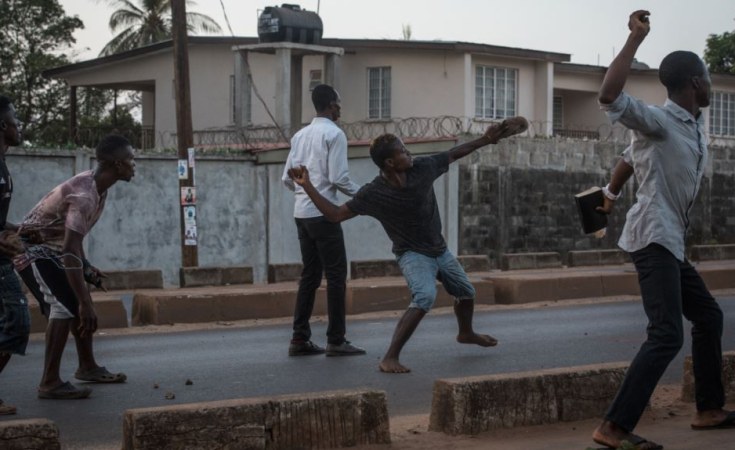Sierra Leone — It was a day of unrest and violence in the Sierra Leonean Capital, Freetown on Wednesday when anti-government protesters clashed with police in the streets; leaving several people dead and wounded.
Videos on social media showed large crowds of demonstrators, dead bodies, burning cars and piles of burning tires.
Other footage showed a group of young people throwing rocks and marching through smoke-filled streets in Freetown.
Sierra Leone's leadership announced a nationwide curfew on Wednesday in response to the violence it said had caused an unspecified number of deaths, including among the security forces.
Vice-President Mohamed Juldeh Jalloh in a video address said "These unscrupulous individuals have embarked on a violent and unauthorized protest which has led to the loss of lives of innocent Sierra Leoneans, including security personnel."
"The government hereby declares a nationwide curfew. The security sector has been authorized to fully enforce this directive," he said.
He did not say how many people had been killed.
However, the AFP news agency quotes the police spokesman Brima Kamara as saying, "Two police officers, a male and female, were mobbed to death by protesters at the east end of Freetown in the early hour of the protest.
Earlier, internet observatory NetBlocks said Sierra Leone faced a near-total internet shutdown with national connectivity at 5 percent of ordinary levels.
The Economic Community of West African States (ECOWAS) said it condemned the violence and called in a Twitter post for "all to obey law and order and for the perpetrators of the violence to be identified and brought before the law."
The government has criticized the unidentified organizers of the protest, warning that the country already has suffered enough through more than a decade of civil war that ended in 2002.
Reasons Behind The Protest
There have been brewing anger by a large segment of the public for a number of reasons, including a perceived lack of government support for ordinary people who are struggling, said Augustine Sorie-Sengbe Marrah, a constitutional lawyer and governance activist.
"There has been little empathy from the central government to encourage folks that they see them suffering, and that they understand these are tough economic times," Marrah told Reuters.
Long-standing frustration has also been exacerbated by rising prices for basic commodities in Sierra Leone, where more than half the population of around eight million lives below the poverty line, according to the World Bank.
"People are upset about the country's justice system which is sickening, daily price rises and economic hardship," Daniel Alpha Kamara, a university student was also quoted by Reuters.
The protesters demanded the departure of President Julius Maada Bio, who was elected in 2018 and still has 10 months left in his term. The demonstrators chanted "Bio must go" as they made their way through the capital, Freetown.
Government Was Aware of Protest
In the build up to the anti-government protest, organizers launched a social media campaign calling on the pubic turn out in their numbers to form part of the demonstration.
The Government alerted the army to provide backup for the police in case of any eventuality.
On Tuesday, August 9 - a day before the protest, the national security coordinator, Abdulai Caulker, by the directive of the Vice President, ordered the Armed Forces to be prepared to back up the police from August 9-12, warning of a "potentially volatile security situation", according to an internal letter shared widely online.
In the communication, Caulker said, "the Vice President and Deputy Chairman of the National Security Council has directed the Republic of Sierra Leone Armed Forces (RSAF) to assist the Sierra Leone Police (SLP) under the backing of Military aid to civil power (MACP) policy in the emergency category."
"This directive is consequence on the potentially volatile security situation in the country caused by repeated social media incitements of the gullible population to embark on a country-wide violent demonstrations with the aim of subverting the peace and stability of the state. The SLP has assessed its resources and advised that it may not alone cope with the emerging security situation."
The objective of the directive, Caulker add, is to ensure that proportionate plans are made and necessary actions taken by RSLAF in support of SLP to ensure the security of the state and its wellbeing.
Meanwhile, the latest situation in Sierra Leone has left the Mano River Union (MRU) countries including Sierra Leone's closest neighbors - Liberia and Guinea on the edge as citizens of these countries continue to grapple with high price of basic commodities such as petroleum and rice.


